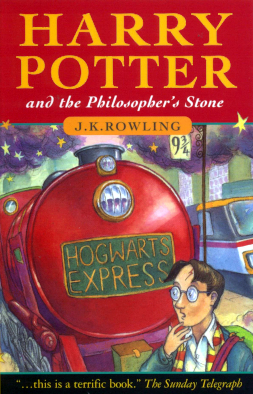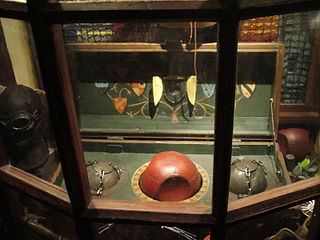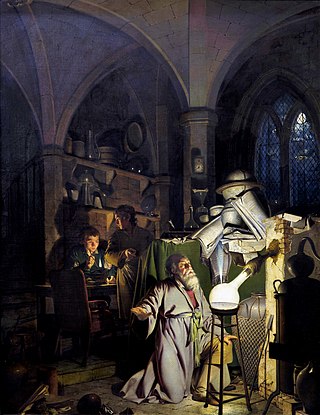
Proclus Lycius, called Proclus the Successor, was a Greek Neoplatonist philosopher, one of the last major classical philosophers of late antiquity. He set forth one of the most elaborate and fully developed systems of Neoplatonism and, through later interpreters and translators, exerted an influence on Byzantine philosophy, Early Islamic philosophy, Scholastic philosophy, and German Idealism, especially G.W.F. Hegel, who called Proclus's Platonic Theology "the true turning point or transition from ancient to modern times, from ancient philosophy to Christianity."

Harry Potter and the Philosopher's Stone is a fantasy novel written by the British author J. K. Rowling. It is the first novel in the Harry Potter series and was Rowling's debut novel. It follows Harry Potter, a young wizard who discovers his magical heritage on his eleventh birthday when he receives a letter of acceptance to Hogwarts School of Witchcraft and Wizardry. Harry makes close friends and a few enemies during his first year at the school. With the help of his friends, Ron Weasley and Hermione Granger, he faces an attempted comeback by the dark wizard Lord Voldemort, who killed Harry's parents but failed to kill Harry when he was just 15 months old.

Quidditch is a fictional sport invented by author J. K. Rowling for her fantasy book series Harry Potter. It first appeared in the novel Harry Potter and the Philosopher's Stone (1997). In the series, Quidditch is portrayed as a dangerous but popular sport played by witches and wizards riding flying broomsticks.

Pyrrho of Elis was a Greek philosopher of Classical antiquity, credited as being the first Greek skeptic philosopher and founder of Pyrrhonism.

The philosopher's stone is a mythic alchemical substance capable of turning base metals such as mercury into gold or silver; it was also known as "the tincture" and "the powder". Alchemists additionally believed that it could be used to make an elixir of life which made possible rejuvenation and immortality.
Kali Yuga, in Hinduism, is the fourth, shortest, and worst of the four yugas in a Yuga Cycle, preceded by Dvapara Yuga and followed by the next cycle's Krita (Satya) Yuga. It is believed to be the present age, which is full of conflict and sin.
Hecataeus of Miletus, son of Hegesander, was an early Greek historian and geographer.

Beyond Good and Evil: Prelude to a Philosophy of the Future is a book by philosopher Friedrich Nietzsche that covers ideas in his previous work Thus Spoke Zarathustra but with a more polemical approach. It was first published in 1886 under the publishing house C. G. Naumann of Leipzig at the author's own expense and first translated into English by Helen Zimmern, who was two years younger than Nietzsche and knew the author.
Contemporary philosophy is the present period in the history of Western philosophy beginning at the early 20th century with the increasing professionalization of the discipline and the rise of analytic and continental philosophy.

Bryan Edgar Magee was a British philosopher, broadcaster, politician and author, best known for bringing philosophy to a popular audience.
Axial Age is a term coined by the German philosopher Karl Jaspers. It refers to broad changes in religious and philosophical thought that occurred in a variety of locations from about the 8th to the 3rd century BCE.

Socratic dialogue is a genre of literary prose developed in Greece at the turn of the fourth century BC. The earliest ones are preserved in the works of Plato and Xenophon and all involve Socrates as the protagonist. These dialogues, and subsequent ones in the genre, present a discussion of moral and philosophical problems between two or more individuals illustrating the application of the Socratic method. The dialogues may be either dramatic or narrative. While Socrates is often the main participant, his presence in the dialogue is not essential to the genre.

The American Philosophical Association (APA) is the main professional organization for philosophers in the United States. Founded in 1900, its mission is to promote the exchange of ideas among philosophers, to encourage creative and scholarly activity in philosophy, to facilitate the professional work and teaching of philosophers, and to represent philosophy as a discipline. The APA's governance has included Robert Audi, Jaegwon Kim and Ruth Barcan Marcus.

The Republic is a Socratic dialogue, authored by Plato around 375 BC, concerning justice, the order and character of the just city-state, and the just man. It is Plato's best-known work, and one of the world's most influential works of philosophy and political theory, both intellectually and historically.
Literae humaniores, nicknamed Greats, is an undergraduate course focused on classics at the University of Oxford and some other universities. The Latin name means literally "more human literature" and was in contrast to the other main field of study when the university began, i.e. res divinae, also known as theology. Lit. hum., is concerned with human learning, and lit. div. with learning treating of God. In its early days, it encompassed mathematics and natural sciences as well. It is an archetypal humanities course.

History of Western Philosophy is a 1946 book by British philosopher Bertrand Russell (1872–1970). A survey of Western philosophy from the pre-Socratic philosophers to the early 20th century, each major division of the book is prefaced by an account of the historical background necessary to understand the currents of thought it describes. When Russell was awarded the Nobel Prize in Literature in 1950, A History of Western Philosophy was cited as one of the books that won him the award. Its success provided Russell with financial security for the last part of his life. The book was criticised, however, for over-generalizations and omissions, particularly from the post-Cartesian period, but nevertheless became a popular and commercial success, and has remained in print from its first publication.

Harry Potter is a series of seven fantasy novels written by British author J. K. Rowling. The novels chronicle the lives of a young wizard, Harry Potter, and his friends, Hermione Granger and Ron Weasley, all of whom are students at Hogwarts School of Witchcraft and Wizardry. The main story arc concerns Harry's conflict with Lord Voldemort, a dark wizard who intends to become immortal, overthrow the wizard governing body known as the Ministry of Magic, and subjugate all wizards and Muggles.

The term monad is used in some cosmic philosophy and cosmogony to refer to a most basic or original substance. As originally conceived by the Pythagoreans, the Monad is the Supreme Being, divinity or the totality of all things. According to some philosophers of the early modern period, most notably Gottfried Wilhelm Leibniz, there are infinite monads, which are the basic and immaterial elementary particles, or simplest units, that make up the universe.
Romanian philosophy is a name covering either:
The history of political thought encompasses the chronology and the substantive and methodological changes of human political thought. The study of the history of political thought represents an intersection of various academic disciplines, such as philosophy, law, history and political science.












